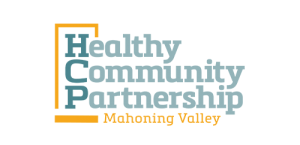Partner Spotlight: Robin Perry, HCP-MV Network Coordinator
The Healthy Community Partnership-Mahoning Valley is very excited to welcome a new member to our team. Robin Perry will be joining the Partnership as a full-year AmeriCorps VISTA beginning her term on August 31, 2020 and concluding the following year. She will be serving in a role titled the HCP-MV Network Coordinator, where she will enhance HCP-MV’s ability to effectively manage collaborative projects.
Some of the activities she will be engaged in will include improving internal and external communications and developing a story bank to capture and share success stories. Through saving and sharing real stories, HCP-MV will be better able to show the connection between data and lived experience. This connection between quantitative and qualitative information will advance HCP-MV’s mission to improve health and access to opportunity for residents in the Mahoning Valley, especially those with the most significant health disparities/inequities because of race, gender, economic status, etc. The HCP-MV Network Coordinator will also work with HCP-MV members to improve and increase connections to residents by identifying ways to build strong, long-term relationships and identify volunteer opportunities connected to the work of HCP-MV partners and strategies.
The HCP-MV Network Coordinator will also collaborate with HCP-MV policy and data teams to research best or promising practices for long-term health improvement and identify potential funding or other resources (trainings, workshops, or other professional development opportunities) to support HCP-MV initiatives and/or membership.
Robin’s undergraduate experience at the College of Wooster while completing a bachelor’s degree in public policy has provided her with a strong foundation regarding how policy impacts individuals’ lives every day as well as the roles we can play as advocates to change policies that are harming our ability to live full, healthy lives.
Below, Robin responded to a few big picture questions about health and has shared a little bit about herself so we can get to know her as a part of our team. So, once again, welcome Robin!
◊
I’m a recent college graduate of the College of Wooster originally from Parma, OH. I have two sisters who are also very service oriented. We get this from our mother who has been working for and volunteering for various causes as long as I can remember. In my undergrad I started dating a trans woman and became deeply embedded in the trans community on my college campus. I listened to the complaints of my fellow students and my own girlfriend and realized a need so I ran for student government and began a campaign to completely change my college’s housing policies and available sexual health materials. My goal for the future is to be able to continue my advocacy work for the health and wellbeing of disadvantaged groups at an even larger level than just a college campus.
What does it mean to you to be healthy?
I think my idea of what it means to be healthy is really inspired by what I learned while studying Chinese medicine’s approach to pain during undergrad while also being diagnosed with a migraine disorder. In Chinese medicine, health does not mean no pain. Pain can be healing (like acupuncture). For me, being healthy is not the absence of pain but the maintenance of it. It’s to be able to live comfortably with my body even if sometimes there is mental, physical, or emotional pain.
What does a healthy community look like? What sorts of challenges might get in the way?
I think a healthy community is one that communicates and works together to solve problems. I think it’s also equitable and considers multiple viewpoints before moving forward with changes. I think sometimes policy and other society structures can get in the way as they can at times favor one group over another. A challenge we ran into at my college was the building code requirement that there be an equal number of “male” and “female” bathrooms when we were trying to make a plan for gender inclusive restrooms. That policy was intended to make sure there are an equal number of women’s restrooms available but doing that also could negatively impact the availability of restrooms for gender nonconforming individuals.

Robin and her roommates at the Kauke Arch in Wooster celebrating the success of the gender inclusive housing policy they developed.
What has been your greatest accomplishment so far to make the community you’re living in a healthier, more equitable place?
I think my greatest accomplishment was the gender inclusive housing policy at my college. Especially since I got to be one of the first guinea pigs for it as I promised to prove that it works and makes a healthier more equitable community. As a result of that policy change trans and gender nonconforming students reported being more comfortable and safe living in housing outside of the gender inclusive housing community. I personally was very happy to live with people I was comfortable living with regardless of their gender identity or sex assigned at birth. I’m also pleased that it’s a lasting change that will outlive my graduation from the college as they continue to remodel buildings to better fit the gender inclusive housing model.
What do you hope to accomplish while with HCP to help make the Mahoning Valley a healthier, more equitable community?
I hope to create sustainable solutions that the community has asked for. I don’t want to push my ideas of solutions onto the community. My goal in all my work has always been to create solutions that the people I am serving asked for. I want to always remain open to where I am needed and change my own efforts and ideas for what is needed. I believe creating an equitable community can only be done as a collaborative effort between those serving the community and the community itself. So, my first goal is to listen to others and gain an understanding of the community and its people so I can serve in the way that the community needs.
How do you incorporate rest and/or self-care into your routine?
As someone with migraine rest and self-care is detrimental to my not just my mental health but my pain management. I’ve realized my limits. One way I incorporate self care is realizing when I need to be done for the day. I found I get more migraines if I’m working really late at night. This has made me a morning person instead. I also make sure to maintain my hobby of collecting and repairing retro video game systems. As well as taking a break from everything by playing video games in the evening with my girlfriend.

